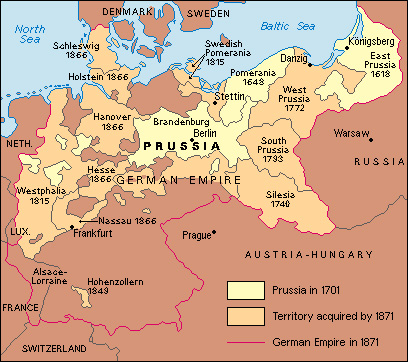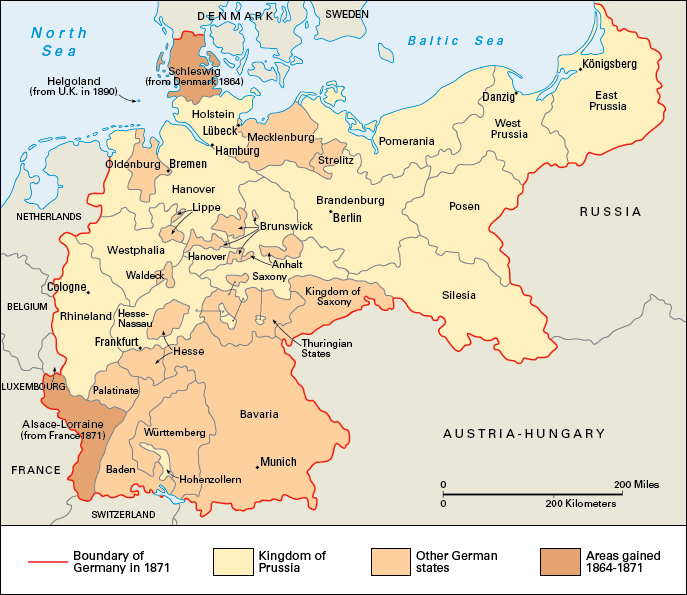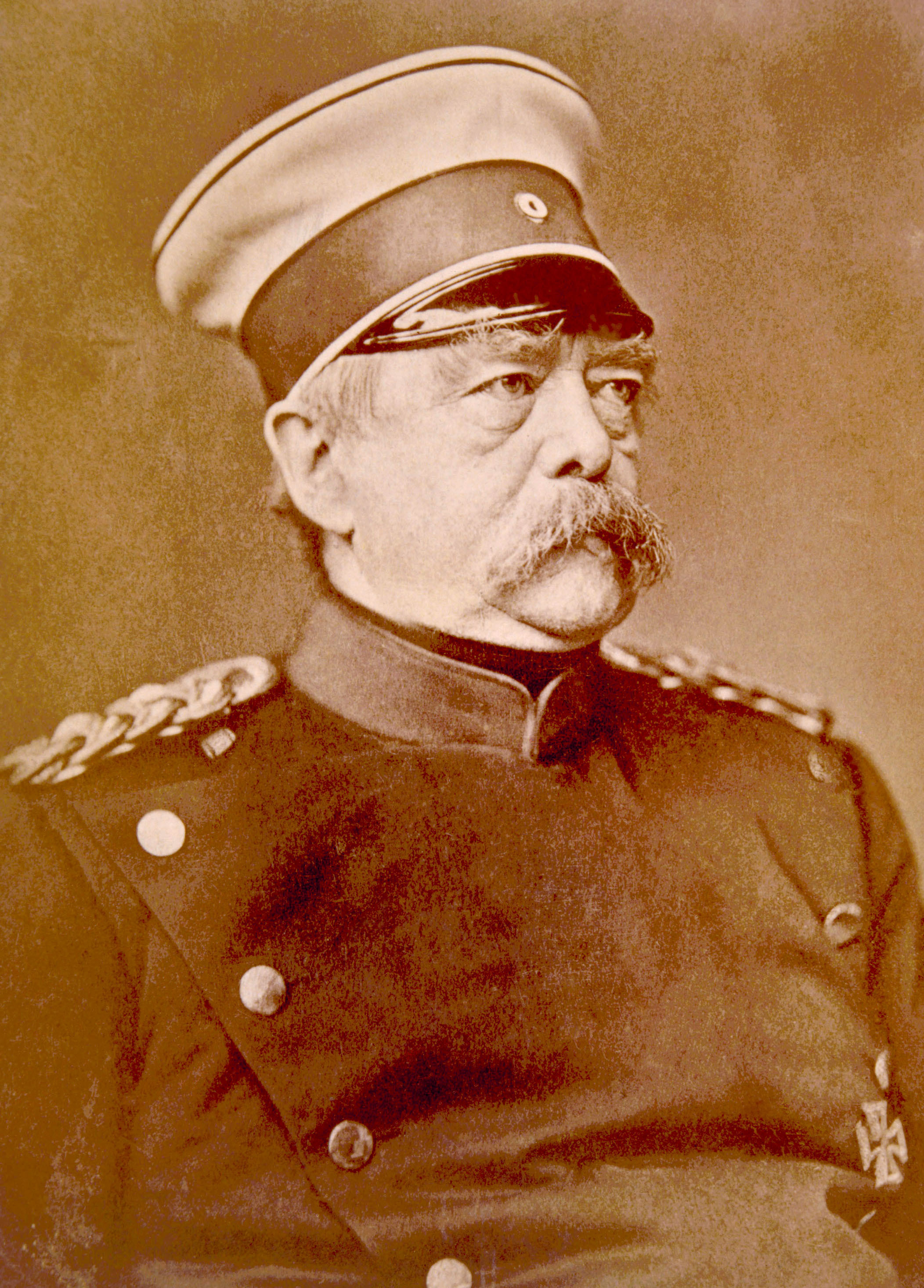Prussia was a powerful Germanic nation in north-central Europe for hundreds of years. In the 1860’s and early 1870’s, Prussia unified the many independent German states, creating the German Empire in 1871. The Prussian king became emperor. Prussia was the largest and most powerful state in the newly unified Germany. After World War II (1939-1945), Prussia was broken up into small districts and ceased to exist as a German state. Much of the land once called Prussia now lies in Lithuania, Poland, Russia, and eastern Germany.

Prussia was more than the name of a country, however. It also represented a military way of life. Prussian armies were among the most rigidly drilled and disciplined in the world. Their generals were from the aristocratic landowning class and owned large estates.
The land and its resources.
At the height of its power in the late 1800’s, Prussia occupied most of the northern two-thirds of Germany. Prussia controlled territory that extended from Belgium and the Netherlands on the west to Russia on the east. The North Sea and the Baltic Sea bordered Prussia on the north. Austria-Hungary lay to the south. Prussia’s main cities were Berlin, which was the capital, and Königsberg (now Kaliningrad), which was located in East Prussia.

Prussia had a low, sandy coast, bordered by many lagoons. The coast was separated from the central plain of Prussia by a belt of lakes and tree-covered hills. The central plain contained many lakes and waterways. Highlands south of the plain contained deposits of many minerals, including coal, iron, silver, copper, nickel, and lead. The most fertile land for farming lay in the valleys of the Oder, Elbe, and Rhine rivers.
The Prussian people.
The rulers of Prussia were headed by the royal family of Hohenzollern. They controlled lands originally populated by Slavs, and conquered and colonized by Germans in the Middle Ages. By the late 1500’s, a small number of aristocratic landlords, called Junkers, had come to own most of the land in Prussia. The people who worked on the Junkers’ estates were called serfs. Serfs rarely owned their own land. They were bound from birth to their lord’s estate and were obligated to farm the lord’s land. Male serfs were also forced to serve in the army.
Early history.
The story of the rise of the Hohenzollern family is the story of Prussia. The Hohenzollerns were a family of German counts. In 1415, Holy Roman Emperor Sigismund made Frederick of Hohenzollern the ruler, or margrave, of the large district, or mark, of Brandenburg. In 1417, Frederick received the title elector of Brandenburg, which allowed him and his successors to take part in elections of the Holy Roman emperors. In the 1600’s, the Hohenzollerns added East Prussia and Pomerania to their territory.
Prussia was greatly strengthened during the rule of the Great Elector, Frederick William, from 1640 to 1688. His son Frederick I was crowned the first king of Prussia in 1701. He built a strong army.
Frederick II,
or Frederick the Great, became king of Prussia in 1740. He was an enlightened ruler who believed that the king’s duty was to be “the first servant of the state.” Frederick II helped shape a government based on discipline and authority, whose primary function was to support the Prussian military.
Using the strong army his father had organized, he seized Silesia from Austria in 1740. In the late 1700’s, he expanded Prussia further by taking part of Poland.
Napoleonic period.
Less skillful rulers followed Frederick II, and Napoleon easily defeated the Prussians in 1806. Reformers initiated changes hoping to restore Prussia’s power. The Junkers lost their near monopoly of the land and of officer posts in the army. The serfs were freed, and a few peasants gained land. Army reformers established universal military training and invigorated the army with patriotic spirit. A Prussian army commanded by Gebhard von Blücher helped defeat Napoleon at Leipzig in 1813 and at Waterloo in 1815.
German empire.
Prussia reached the peak of its power after King Wilhelm I was crowned in 1861 and chose Otto von Bismarck as prime minister. Bismarck strengthened the Prussian army and set out to unify Germany under Prussian control. In 1864, Prussia and Austria gained the Danish duchies of Schleswig and Holstein. A quarrel between Austria and Prussia in 1866 led to the Seven Weeks’ War, which Prussia won. Prussia then formed the North German Confederation, unifying all of Germany north of the Main River. In 1870, Bismarck maneuvered France into war. Germany’s success in the war enabled Bismarck to persuade Germany’s southern states to join with the North German Confederation in forming the German Empire. The empire was established in 1871 with King Wilhelm I as its first kaiser (emperor).

Decline of Prussia.
Prussian militarism was one cause of World War I (1914-1918), a war that Germany lost. In the peace settlement, Poland gained a strip of land called the Polish Corridor. This land separated East Prussia from the rest of Germany. World War II began after German dictator Adolf Hitler invaded Poland to reclaim the land lost in World War I. Prussian generals, some of them Junkers, commanded many of Hitler’s armies. But some Prussian Junkers opposed Hitler and were executed after they plotted to assassinate him. The war brought heavy destruction to Prussia.
When the war ended, the Allies gave the northern half of East Prussia to the Soviet Union. The rest of Prussia east of the Oder and Neisse rivers, along with the city of Stettin (now Szczecin), became part of Poland. In 1947, the Allied Control Council legally abolished the state of Prussia.
